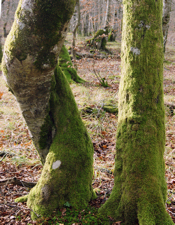The Crooked Timber of Ourselves
May 1, 2020Podcast: Download (Duration: 2:14 — 2.1MB)
Subscribe: More
“Finding yourself.” Nearly everyone wants to do it, and many are willing to pay for the trip. It’s worth the effort because when you find yourself, your true self, you dwell in authenticity, creativity, and power. Right?
Not so right. Unfortunately, the Western idea of finding yourself goes only half way. After all, what we discover when we find ourselves is what the German philosopher Immanuel Kant called “the crooked timber of human-ity.” Kant said, “Out of the crooked timber of humanity, no straight thing was ever made.”
 As Kant knew, what we do with ourselves after we find ourselves is the real work. After we find ourselves, there’s a whole lot of sawing and hammering and sanding and shellacking to be done. As a matter of fact, we’ve got to saw, hammer, sand, and shellac ourselves every darn day. Perfection isn’t the goal. A life well-lived is the goal.
As Kant knew, what we do with ourselves after we find ourselves is the real work. After we find ourselves, there’s a whole lot of sawing and hammering and sanding and shellacking to be done. As a matter of fact, we’ve got to saw, hammer, sand, and shellac ourselves every darn day. Perfection isn’t the goal. A life well-lived is the goal.
One tool we can use is a working definition of integrity. In my mind, integrity is born out of a match between inner ideals and outer action. For example, if creating justice is my goal, I can’t just seek to discover what justice means in the abstract, I need to determine what justice means in my own actions toward the greater whole.
Sure, “finding yourself” is great. But it’s only a step in the right direction. Next we’ve got to grab some tools and work on that crooked timber of ourselves.
David Breeden earned an MFA degree from The Iowa Writers' Workshop, a PhD from the Center for Writers at the University of Southern Mississippi, and a Master of Divinity from Meadville Lombard Theological School. He has published several books of poetry, translations, and essays. His blog and sermons can be found at www.FirstUnitarian.org
- The Crooked Timber of Ourselves - May 1, 2020
- Justice, Elections, and Whiteness - November 6, 2014
- Conscience and Choosing the Hill to Die On - October 30, 2014
Comments are closed.
Quest Monthly Print Edition
Recent Issues
Latest Spiritual Reflection Posts
Weekly Newsletter
About
Quest for Meaning is a program of the Church of the Larger Fellowship (CLF).
As a Unitarian Universalist congregation with no geographical boundary, the CLF creates global spiritual community, rooted in profound love, which cultivates wonder, imagination, and the courage to act.
Contact
Church of the Larger Fellowship Unitarian Universalist (CLFUU)
24 Farnsworth Street
Boston MA 02210

I recently started reading and absorbing the ancient wisdom of Stoic philosophy. The major tool or quest of this philosophy is virtue.